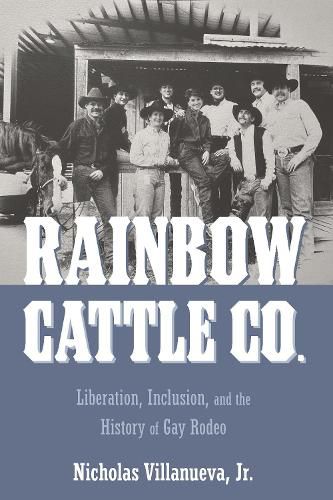Readings Newsletter
Become a Readings Member to make your shopping experience even easier.
Sign in or sign up for free!
You’re not far away from qualifying for FREE standard shipping within Australia
You’ve qualified for FREE standard shipping within Australia
The cart is loading…






Rainbow Cattle Co. tells the story of gay rodeo as an overlooked and important part of the LGBTQ liberation movement. Nicholas Villanueva, Jr., argues that the history of gay liberation has been oversimplified as a fight for sexual freedom in the major cities of the 1970s. But, as Villanueva reveals, the gay liberation movement thrived in rodeo in the U.S. West and in rural communities throughout America. LGBTQ rodeo athletes liberated themselves from the heteronormative social world of sport and upended stereotypes of sport and queer identity. Organizers, athletes, and spectators fought to protect their rights to openly participate in sports, and their activism was pivotal in the fight against AIDS.
Rainbow Cattle Co. reveals a history of gay liberation through rodeo, which from the mid-1970s provided a safe space where LGBTQ athletes could focus on their sport and evolved into a highly successful philanthropic organization by the end of the twentieth century. This intersectional study of LGBTQ athletes, heteronormativity, Western history, and sport builds on scholarship from ethnic studies, critical sports studies, sociology, and history.
$9.00 standard shipping within Australia
FREE standard shipping within Australia for orders over $100.00
Express & International shipping calculated at checkout
Rainbow Cattle Co. tells the story of gay rodeo as an overlooked and important part of the LGBTQ liberation movement. Nicholas Villanueva, Jr., argues that the history of gay liberation has been oversimplified as a fight for sexual freedom in the major cities of the 1970s. But, as Villanueva reveals, the gay liberation movement thrived in rodeo in the U.S. West and in rural communities throughout America. LGBTQ rodeo athletes liberated themselves from the heteronormative social world of sport and upended stereotypes of sport and queer identity. Organizers, athletes, and spectators fought to protect their rights to openly participate in sports, and their activism was pivotal in the fight against AIDS.
Rainbow Cattle Co. reveals a history of gay liberation through rodeo, which from the mid-1970s provided a safe space where LGBTQ athletes could focus on their sport and evolved into a highly successful philanthropic organization by the end of the twentieth century. This intersectional study of LGBTQ athletes, heteronormativity, Western history, and sport builds on scholarship from ethnic studies, critical sports studies, sociology, and history.